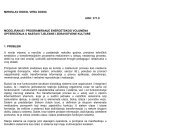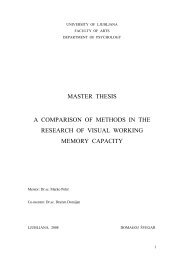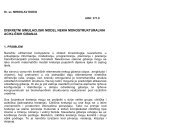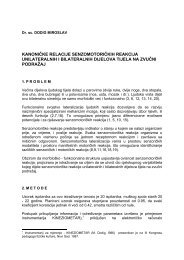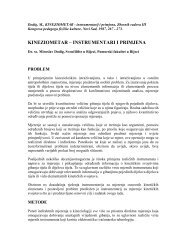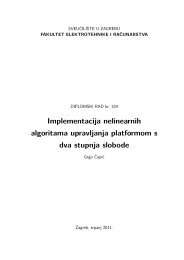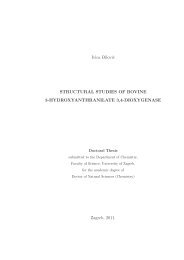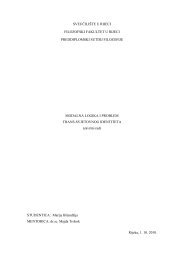Investigating Macroeconomic Determinants of Happiness in ...
Investigating Macroeconomic Determinants of Happiness in ...
Investigating Macroeconomic Determinants of Happiness in ...
You also want an ePaper? Increase the reach of your titles
YUMPU automatically turns print PDFs into web optimized ePapers that Google loves.
the period 1999-2002 (the fourth wave <strong>of</strong> the World Values Survey). In the transition subsample,<br />
<strong>in</strong>flation, GDP per capita and the G<strong>in</strong>i coefficient exert a significant effect on the<br />
dependent variable. An unexpected f<strong>in</strong>d<strong>in</strong>g is that <strong>in</strong>flation seems to <strong>in</strong>fluence life-satisfaction<br />
positively. GDP per capita also has a positive impact, whereas the G<strong>in</strong>i coefficient exerts a<br />
negative impact. The unemployment variable is not statistically significant.<br />
Di Tella et al. (2003) analyse the impact <strong>of</strong> macroeconomic variables on happ<strong>in</strong>ess.<br />
The authors f<strong>in</strong>d evidence that both the level <strong>of</strong> GDP and the change <strong>in</strong> GDP affected nation’s<br />
happ<strong>in</strong>ess <strong>in</strong> Europe <strong>in</strong> 1975-1992. The effect <strong>of</strong> GDP growth on life satisfaction is <strong>in</strong> l<strong>in</strong>e<br />
with the so-called adaptation theories that state that the benefits <strong>of</strong> higher <strong>in</strong>come fade with<br />
time. As regards other macroeconomic variables, Di Tella et al. additionally <strong>in</strong>clude<br />
unemployment rate, <strong>in</strong>flation and an <strong>in</strong>dicator <strong>of</strong> the generosity <strong>of</strong> the welfare state, all <strong>of</strong><br />
which are found to be significant at conventional levels, and <strong>of</strong> expected signs.<br />
Di Tella et al. (2001) f<strong>in</strong>d that, <strong>in</strong> twelve European countries over the period 1975 to<br />
1991, people would trade-<strong>of</strong>f a 1 percentage po<strong>in</strong>t <strong>in</strong>crease <strong>in</strong> the unemployment rate for a 1.7<br />
percentage po<strong>in</strong>t decrease <strong>in</strong> the <strong>in</strong>flation rate. Their f<strong>in</strong>d<strong>in</strong>g is that, unlike the “misery <strong>in</strong>dex”<br />
that attaches equal weight to both <strong>in</strong>flation and unemployment, the coefficient on <strong>in</strong>flation is<br />
smaller; hence unemployment might be more important, i.e. a higher weight is put on it, given<br />
the prevail<strong>in</strong>g unemployment and <strong>in</strong>flation rates. This, however, depends on the equation<br />
specification, and should, hence, not be over-<strong>in</strong>terpreted.<br />
Wolfers (2003) <strong>in</strong>vestigates the l<strong>in</strong>k between happ<strong>in</strong>ess and bus<strong>in</strong>ess cycle variations<br />
<strong>in</strong> unemployment and <strong>in</strong>flation. He uses the Eurobarometer survey for 16 countries <strong>in</strong> the<br />
years 1973-1998. The results suggest that the <strong>in</strong>flation-unemployment trade-<strong>of</strong>f is one to five;<br />
i.e. that people would be <strong>in</strong>different between rais<strong>in</strong>g unemployment by 1 percentage po<strong>in</strong>t and<br />
rais<strong>in</strong>g <strong>in</strong>flation by 5 percentage po<strong>in</strong>ts.<br />
Blanchflower (2007) analyses both micro and macro determ<strong>in</strong>ants <strong>of</strong> happ<strong>in</strong>ess <strong>in</strong><br />
twenty-five OECD countries. The macroeconomic variables used <strong>in</strong> this paper <strong>in</strong>clude<br />
unemployment, <strong>in</strong>flation, GDP per capita and <strong>in</strong>terest rate, depend<strong>in</strong>g on the specification<br />
used. Blanchflower f<strong>in</strong>ds that <strong>in</strong>flation, unemployment and <strong>in</strong>terest rates affect happ<strong>in</strong>ess<br />
significantly and negatively. GDP per capita is found to be important only <strong>in</strong> poorer countries.<br />
His estimates also imply that a one percentage <strong>in</strong>crease <strong>in</strong> the unemployment rate dim<strong>in</strong>ishes<br />
happ<strong>in</strong>ess more than the same change <strong>in</strong> the <strong>in</strong>flation rate does. This trade-<strong>of</strong>f is found to be<br />
one to 1.62.<br />
Malesevic Perovic (2008) analyses the impact <strong>of</strong> macroeconomic determ<strong>in</strong>ants on<br />
subjective economic well-be<strong>in</strong>g <strong>in</strong> a set <strong>of</strong> eight transition countries <strong>in</strong> the period 1991-1998.<br />
5



